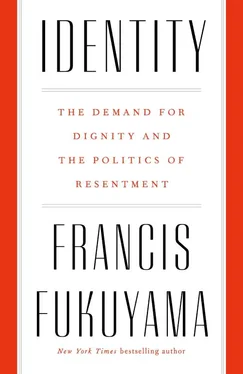EXPRESSIVE INDIVIDUALISM
The French Revolution unleashed what would become two different versions of identity politics across the world, though that term was not used to describe either phenomenon at the time. One stream demanded the recognition of the dignity of individuals, and the other the dignity of collectivities.
The first, individualistic stream began with the premise that all human beings were born free and were equal in their desire for freedom. Political institutions were created to preserve as much of that natural freedom as possible, consistent with the need for a common social life. Liberal democracies put the equal protection of individual autonomy at the core of their moral projects.
But what was meant by autonomy? Martin Luther, as we have seen, stood in a long Christian tradition that saw mankind’s freedom as a gift from God that gave human beings dignity above the rest of the natural world. [2] Strictly speaking, Luther believed that faith was a gift from God, the result of God’s grace, and was not something that could simply be willed by individuals. The Calvinists carried this doctrine further, believing that individuals were predestined either to be saved or not; they had no agency in the outcome. Nonetheless, under both doctrines faith was a characteristic of the inner self and still enjoined obedience to God’s law, the content of which was not subject to human choice.
But that freedom was limited to the ability to have faith and to follow God’s law. Kant continued in this tradition, providing a secularized version of autonomy centered on the human ability to make moral choices based on abstract rules of reason. Human dignity for Kant was grounded in his view that all individuals were uncaused causes, capable of exercising genuine free will in a fashion not subject to the laws of physics. But Kant’s rules such as the categorical imperative were not the objects of individual human choice; they were derived through philosophical reasoning and applied categorically to all human beings.
In this tradition, then, human dignity centers on an individual’s ability to make proper moral choices, whether defined by religion or by secular reason.
The idea that dignity is rooted in human moral choice has received political recognition by becoming embedded in a significant number of modern democratic constitutions, including those of Germany, Italy, Ireland, Japan, Israel, and South Africa. For example, article I, section 1, of the German Basic Law of 1949 states, “The dignity of man is inviolable. To respect and protect it shall be the duty of all public authority.” Similarly, section 10 of the South African constitution states, “Everyone has inherent dignity and the right to have their dignity respected and protected.” The South African Constitutional Court has noted, “A right to dignity is an acknowledgment of the intrinsic worth of human beings.”
None of these constitutions defines precisely what human dignity is, and scarcely a politician in the Western world if pressed could explain its theoretical basis. To understand the provenance of such references to human dignity, one needs to look at the lexical origins of the words used, and the historical path by which they came to be written. The Kantian origin of the concept of dignity is evident in both the German and the South African cases. The German law’s use of the word inviolable implies that all other rights are subordinated to this fundamental right and harks back to the categorical imperative, as does the South African reference to “intrinsic worth.” {1} 1 Rex Glensy, “The Right to Dignity,” Columbia Human Rights Law Review 43 (65) (2011): 65–142.
The Christian origins of the right to dignity are evidenced by the fact that it was Christian Democratic parties primarily that pushed for constitutional protections of dignity, beginning with the Irish constitution of 1937. None of these constitutions mentions Christianity explicitly, however, or seeks to link political rights to religious belief. {2} 2 Samuel Moyn, “The Secret History of Constitutional Dignity,” Yale Human Rights and Development Journal 17 (2) (2014): 39–73. The term dignity has entered into arguments over abortion, since the Catholic Church has maintained that human dignity begins at conception and constitutes an inviolable moral status.
The Anglo-American liberal tradition that began with Hobbes and Locke and continued through nineteenth-century thinkers such as John Stuart Mill took a less metaphysical approach to autonomy. This tradition does not build autonomy around free will; freedom is simply the ability to pursue one’s desires and passions free of external constraint. (For Hobbes, human beings are like machines propelled forward by their desires; will is simply “the last appetite in deliberating,” or an individual’s strongest desire.) As a consequence, the word dignity , with its Christian-Kantian overtones, does not appear in the U.S. Constitution, or in founding documents such as the Federalist Papers. {3} 3 Glensy (“Right to Dignity,” 77) notes that the word dignity appears in Federalist No. 1 (by Hamilton), but only in conjunction with the status of high officials.
Nonetheless, the Hobbesian notion that human beings are fundamentally equal in their natural freedom becomes the basis for the political rights on which the social contract is based. Hobbes’s natural right to life becomes embedded in the American Declaration of Independence as part of the right to “life, liberty, and the pursuit of happiness.” Thus a slightly different premise concerning the nature of autonomy leads to a similar regime dedicated to the equal protection of individual rights.
The liberal political tradition institutionalized one version of individual autonomy, by granting equal rights to citizens. But Rousseau’s version of autonomy pointed to something deeper and richer than “mere” political participation. He saw within himself a “plenitude” of feeling that was suppressed by society; his was an unhappy consciousness that was deeply alienated by the society and struggled for liberation. As Charles Taylor explains:
This is the powerful moral ideal that has come down to us. It accords crucial moral importance to a kind of contact with myself, with my own inner nature, which it sees as in danger of being lost, partly through the pressures towards outward conformity, but also because in taking an instrumental stance to myself, I may have lost the capacity to listen to this inner voice. {4} 4 Taylor, Ethics of Authenticity , 29.
This was part of the moral revaluation that began with Luther. The traditional Christian understanding of the inner self saw it as the site of original sin: we are full of evil desires that lead us to contravene God’s law; external social rules, set by the Universal Church, lead us to suppress these desires. Rousseau followed Luther, but flipped the latter’s valuation: the inner self is good or at least has the potential for being good; it is the surrounding moral rules that are bad. But for Rousseau, freedom is not just the moral choice to accept moral rules; it becomes the full expression of the feelings and emotions that constitute the authentic inner self. These feelings and emotions are often best expressed in art.
As Lionel Trilling brilliantly explained in his book Sincerity and Authenticity , European literature post-Rousseau saw the rise of a genre of writing that began with Diderot’s Rameau’s Nephew and Goethe’s Sufferings of Young Werther , which celebrated the artist who is unable to find a home in society, who seeks the authentic expression of his or her creative genius. Figures such as Vincent van Gogh or Franz Kafka, unappreciated in their own time, became iconic symbols of the obtuseness of a philistine society that could not appreciate the depths of individuality they represented.
Читать дальше












